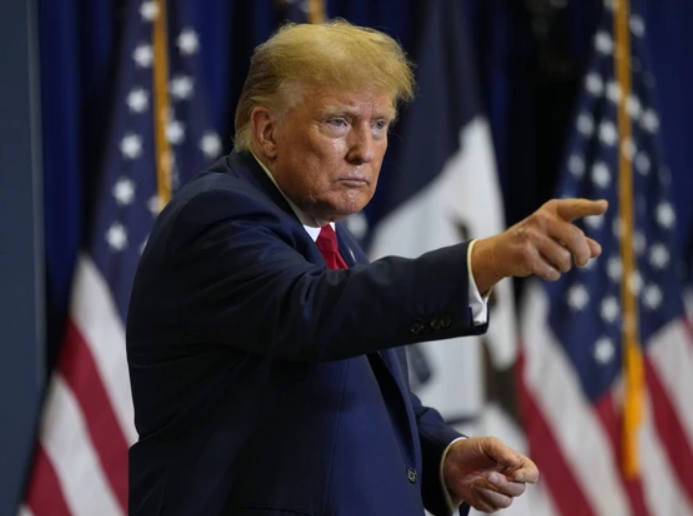(BBC News) The US Supreme Court says it will hear a historic case to determine whether Donald Trump can run for president.
The justices agreed to take up Trump’s appeal against a decision by Colorado to remove him from the 2024 ballot in that state.
The case will be heard in February, and the ruling will apply nationwide.
Lawsuits in a number of states are seeking to disqualify Trump, arguing that he engaged in insurrection during the US Capitol riot three years ago.
The legal challenges hinge on whether a Civil War-era constitutional amendment renders Trump ineligible to stand as a candidate.
The Supreme Court’s decision to hear Trump’s appeal came after attorneys general from 27 states filed a brief asking the court to reject Colorado’s ruling.
In it, they argue that removing Trump from the ballot would “create widespread chaos.”
“Most obviously, it casts confusion into an election cycle that is just weeks away,” reads the submission.
“Beyond that, it upsets the respective roles of the Congress, the states, and the courts.”
The 14th Amendment of the US Constitution bans anyone who has “engaged in insurrection or rebellion” from holding federal office, but the former president’s lawyers argue it does not apply to the president.
His lawyers have argued: “The Colorado Supreme Court decision would unconstitutionally disenfranchise millions of voters in Colorado and likely be used as a template to disenfranchise tens of millions of voters nationwide.”
Trump has also appealed against a decision by electoral officials in Maine to remove him from the ballot.
Following the Supreme Court’s announcement on Friday, Colorado’s Secretary of State Jena Griswold said she had certified the state’s ballots for the upcoming presidential primary elections, and that Trump’s name was on them.
The primary ballots, held in each state, will help to determine which presidential candidates run in November’s election.
Colorado’s is set for the beginning of March – soon after the Supreme Court decision on Trump’s case is expected.
“The United States Supreme Court has accepted the case, and Donald Trump will appear on the ballot as a result,” Griswold said in a statement.
The split 4-3 decision by Colorado’s high court last month marks the first time in US history that the 14th Amendment has been used to disqualify a presidential candidate from the ballot.
This is the first time the Supreme Court will consider how to interpret the clause.
Trump is the current Republican frontrunner for a likely rematch against President Joe Biden, a Democrat, in this November’s election.
Trump’s legal team is due to file their opening brief by January 18.
The group arguing for Trump’s disqualification must submit its argument by January 31.
University of Richmond Professor Cart Tobias says the “exceptionally fast track” was “predictable and necessitated by the growing number of cases being filed in various states around the country.”
With state primary elections fast approaching, there is a “compelling need for election officials in many states to prepare,” and they “need time to plan and execute smooth voting processes on short notice.”
Cases at the Supreme Court normally take four to 12 months – in contrast with the few weeks that justices have currently scheduled.
The timeline makes it likely that the court will issue a ruling ahead of the Super Tuesday primary election in March, when Colorado and many other states hold their election to decide on each party’s candidate for president.
On the day of the US Capitol riot, supporters of Trump stormed Congress as lawmakers were certifying Biden’s election victory.
That day, the then-president held a rally outside the White House where he repeated claims of mass election fraud as he urged protesters to “fight like hell”, but also to march “peacefully” to the Capitol.
Trump’s critics argue that he should be disqualified not only for his actions during the riot, but for his and his campaign’s efforts to overturn the election result in states that he lost.
While Trump’s alleged efforts to subvert the outcome of the 2020 presidential election are the focus of trials in federal court and a state court in Georgia, he has not been criminally charged with inciting insurrection in either case.


